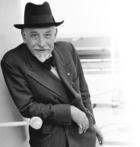
Luigi Pirandello, who liked to define himself (without any allegory), son of Chaos, was born in 1867 in the town of Covusu, Sicily, which at the time, and because of a dialectal deformation according to Pirandello himself, was called Chaos. From a bourgeois and anti-Bourbon family, he suffered during his childhood the lack of communication with the parents, a fact that was evidently reflected in his writings. He studied in Rome and eventually graduated in Romanesque Philology in Bonn with a thesis in German on the speech of the inhabitants of Agrigento. On his return to Italy he came into contact with roman literary circles where he met Luigi Capuana, already famous writer, who incited him to writing. In 1893 he composed his first novel, The Excluded One, which took eight years to publish. The financial bankruptcy of the family business and his wife's mental illness greatly affected the life of the writer who, however, thanks to the international success of his novel The Late Mattia Pascal (1904), was able to recover and dedicate himself exclusively to literature. He forged a unique and innovative philosophy that he described in his essay Humorism and was the author of a large number of important plays, such as the famous Six Characters in Search of Author, Short Stories or Novels as One, None and One Hundred Thousand, which led him to consecration with the Nobel Prize in Literature in 1934. Two years later he became ill with pneumonia while filming a film based on his Mattia Pascal, and died a few days later.




